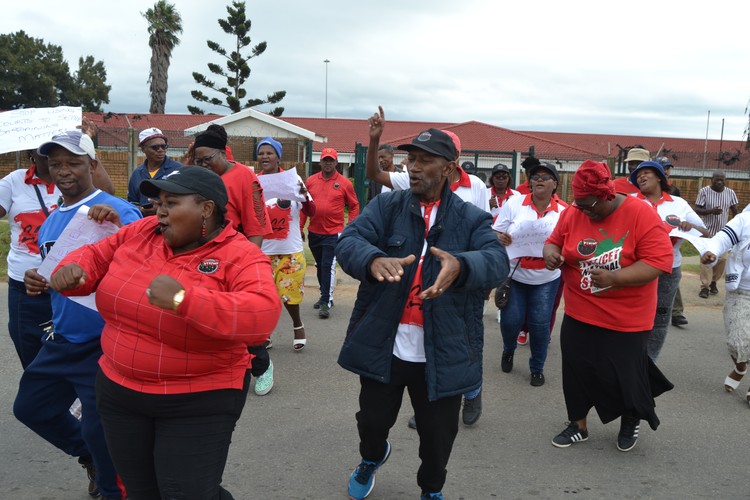NEHAWU won’t sign new 2023-24 public sector wage deal
Several other public service unions conclude 7.5% agreement with government, but NEHAWU says deal for previous year must be finalised first
NEHAWU members protest in Kariega during the strike. Archive photo: Thamsanqa Mbovane
The National Education, Health and Allied Workers’ Union (NEHAWU) says it will not consider the 2023-24 wage agreement with the government, which other unions have signed, until a deal is reached on 2022-23 wages.
Other unions in the public service concluded a 7.5% wage increase with the government for 2023-2024 following negotiations which began on 17 February. These include the South African Democratic Teachers’ Union (SADTU) and unions affiliated with the Federation of Unions of South Africa (FEDUSA).
But NEHAWU says it is still negotiating last year’s settlement.
After strike action rocked the country for over a week, NEHAWU and other unions reached an agreement on 14 March with the Department of Public Services and Administration to end the strike and return to the negotiating table over the 2022-23 wages.
The agreement said a “no work, no pay” principle would be applied but no employee would be disciplined for taking part in the strike.
Apart from NEHAWU, unions involved in the 14 March deal included the Police and Prisons Civil Rights Union (POPCRU), Democratic Nursing Organisation of South Africa (DENOSA), and South African Policing Union (SAPU).
None of these unions has signed the 2023-24 deal.
According to NEHAWU spokesperson Lwazi Nkolonzi, the union’s “immediate priority” is to conclude 2022-2023 wage negotiations and then look into the issue of 2023-2024. “We cannot go on without having resolved the dispute that led us to go on strike,” he said.
Support independent journalism
Donate using Payfast

Don't miss out on the latest news
We respect your privacy, and promise we won't spam you.
Next: Former Ekurhuleni health workers want their jobs back
Previous: Community protest at court to demand release of local “crime fighters”
© 2023 GroundUp. This article is licensed under a Creative Commons Attribution-NoDerivatives 4.0 International License.
You may republish this article, so long as you credit the authors and GroundUp, and do not change the text. Please include a link back to the original article.
We put an invisible pixel in the article so that we can count traffic to republishers. All analytics tools are solely on our servers. We do not give our logs to any third party. Logs are deleted after two weeks. We do not use any IP address identifying information except to count regional traffic. We are solely interested in counting hits, not tracking users. If you republish, please do not delete the invisible pixel.

